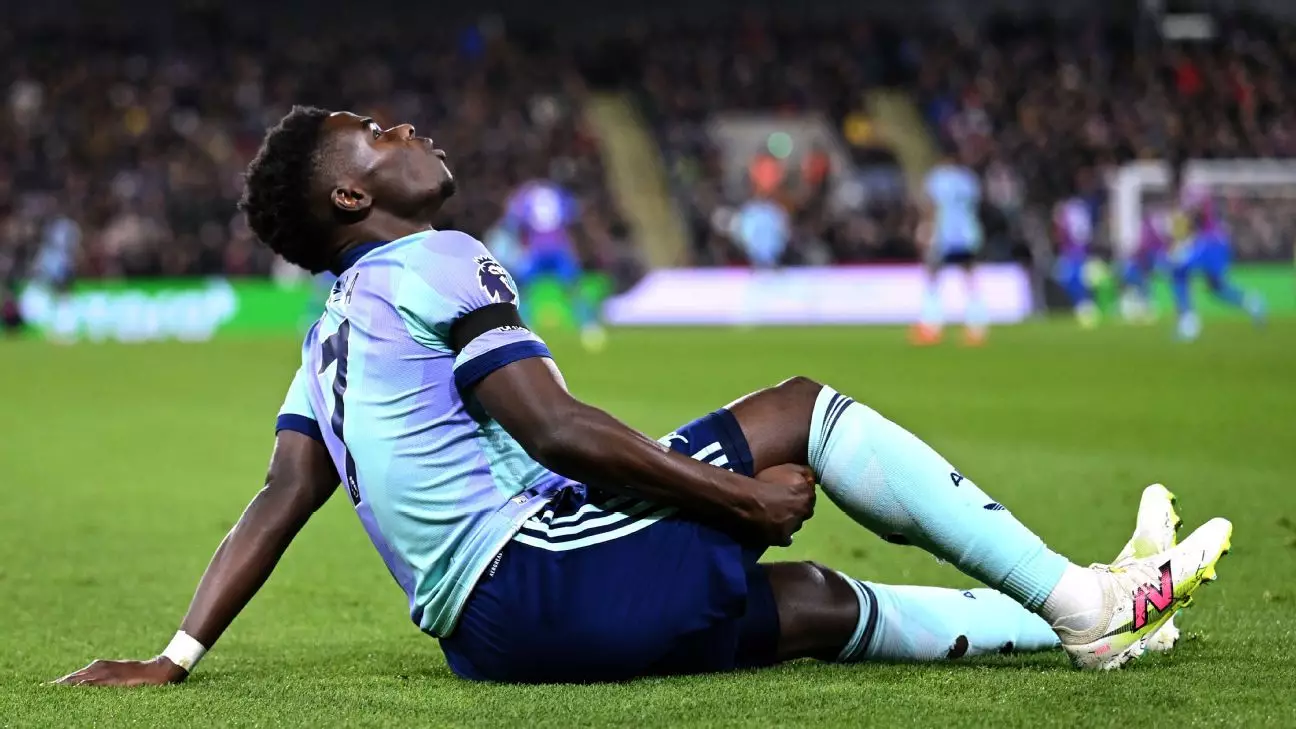In the world of football, injuries are not just unfortunate setbacks; they can dramatically alter the trajectory of a team’s season. Arsenal’s recent revelation that winger Bukayo Saka will be sidelined for “many weeks” due to a torn hamstring is a significant event that resonates deeply within the club and its fan base. This article delves into the implications of Saka’s injury, the challenges Arsenal faces, and the mindset they must adopt moving forward.
The injury, confirmed by manager Mikel Arteta after Saka underwent evaluation following the Gunners’ commanding 5-1 victory over Crystal Palace, marks a troublesome period for both the player and the team. The emotional impact on Saka was palpable; leaving the stadium on crutches speaks volumes about the immediate physical toll, but the psychological effects may linger even longer. As Arteta stated, “It’s not looking good,” a chilling understatement reflecting the gravity of the situation. Saka’s absence in the coming weeks not only deprives Arsenal of a key player but also disrupts their attacking rhythm.
With Saka’s contributions of nine goals and 13 assists across all competitions this season, his loss cannot be understated. As one of the starting eleven in 16 of 17 Premier League matches this season, Saka represents the dynamism and creativity that define Arsenal’s offensive strategy. His previous hamstring issues only amplify concerns about his physical resilience, making this injury a recurring nightmare for the coaching staff.
In light of this adversity, Arteta faces a significant challenge: how to adapt the team’s tactics without their star winger. He noted that this situation provides a unique opportunity to explore different strategic options. “It’s going to be a really good exercise for us to think of ways to overcome another challenge,” Arteta expressed, indicating a willingness to innovate during these difficult times. However, he admitted he hasn’t finalized plans, showing that uncertainty can breed hesitation in tactical decisions.
Arteta’s remarks also highlight the importance of team morale. “We need to lift him up,” he said, emphasizing Saka’s role not only as a player but as a character within the dressing room. He encouraged Saka to leverage his energy and positive communication style to inspire teammates during his recovery period. This focus on collective mindset can prove to be a crucial element in maintaining team spirit as they navigate this challenging stretch.
Adding to Arsenal’s challenges, Arteta revealed that winger Raheem Sterling is also expected to be out for a spell due to a knee injury, compounding the pressure on the squad. The absence of both players leaves a notable void in the offensive lineup and raises questions about squad depth. Arteta’s comments on the need for further testing to assess Sterling’s injury suggest that Arsenal’s injury woes may extend beyond Saka, leaving them vulnerable as they head into a busy fixture schedule.
The notion of bolstering the squad in January is worth considering, albeit one fraught with its own complexities. Although Arteta has claimed that the club’s preparation is in place, he acknowledged the unpredictability of injuries. “We predicted more it would be something else,” he mentioned, pointing towards an anticipated defensive crisis, rather than an attacking one—highlighting the difficulty in planning for such unforeseen circumstances.
Looking ahead, Arsenal must summon every ounce of resilience they possess. The upcoming fixture against Ipswich at the Emirates Stadium is now more than just another match; it’s an opportunity for remaining players to step up and fill the gap left by Saka and potentially Sterling.
Bukayo Saka’s injury presents a serious obstacle for Arsenal as they work to maintain their competitive edge in a challenging Premier League landscape. The club’s response—both tactically and emotionally—will be critical in navigating these turbulent waters. This period will test not only the depth of the squad but also the unity and adaptability of the team. In football, as in life, adversity can often lead to unexpected outcomes; it is how the team reacts that will ultimately define their season.

